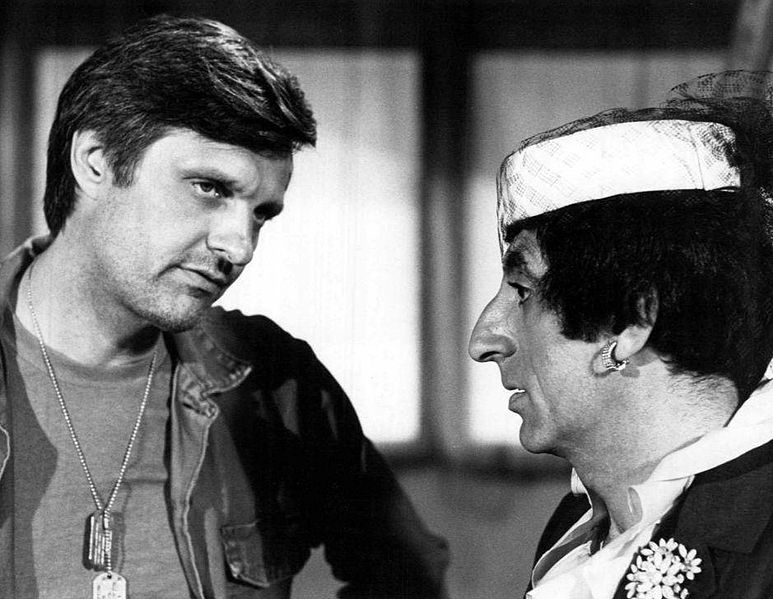Life, Liberty, and M*A*S*H: From Anti-Authority to Government-Skeptical
This fall, LIFE magazine has published a special issue commemorating the 50th anniversary of the movie M*A*S*H. Despite the hook, the issue focuses on the ensuing TV series, which ran from 1972 to 1983. Though the show has often been characterized as being politically left-wing, it actually is heavily classically liberal, celebrating the individual, civil liberties, and the market, and harshly criticizing anti-individualism, government compulsion, and government decision-making. In a series of essays, I examine the classical liberalism of M*A*S*H. This is Part 2. Part 1 is here.

The TV series evolved from a fictionalized war memoir, MASH: A Novel about Three Army Doctors, written by Korean War Army surgeon H. Richard Hornberger Jr., with help from sportswriter and one-time war correspondent W.C. Heinz, and published under the pen name “Richard Hooker” in 1968. The book inspired a 1970 movie, M*A*S*H, directed by Robert Altman and starring Donald Sutherland, Elliott Gould, and Robert Duvall. Hornberger was a conservative Republican with hawkish, nationalist leanings, and his book is frat-boy crude, funny, and largely untainted by the ugliness of war, though honest about the grim nature of “meatball surgery” at a field hospital. The 1970 movie is just as crude and even funnier, and it captures the grisliness of war and the madness of those who love it. Hornberger liked the movie despite its lefty politics, a testament to a time when personal judgments were not always made through a red–blue political lens. Altman wasn’t a fan of the book, though not for political reasons. Both Hornberger and Altman despised the TV series.
One theme common to all three versions of M*A*S*H was the comedic skewering of authority. Hornberger’s book makes clear his opinion that his conscripted, jokester doctors are superior to the military figures and protocols that try to control them. Altman’s movie luxuriates in contempt for authority. The TV series pokes plenty of fun at overpuffed authority figures, from hypocritical flag-waver Maj. Frank Burns (Larry Linville), to unhinged Maj. Gen. Bartford Hamilton Steele (Harry Morgan, who was later recast as the very-different Col. Sherman Potter), to sadistic Col. Sam Flagg (Edward Winter), to a parade of officers willing to trade troops’ lives for ground, glory, and promotion.
But where Hornberger’s skewering is limited to the career military and Altman’s to the military generally, TV’s M*A*S*H has plenty of skepticism for government broadly. The show is not outright anti-government — and neither are proper classical liberals, because government is important for accomplishing certain public goals. But classical liberals know, and M*A*S*H regularly shows, that there is plenty to criticize in what government does — or, more specifically, what the politicians and bureaucrats who animate it do.
Many government failures happen when it extends its reach beyond truly public problems, meddling in people’s private decisions and interactions. But failures also happen when government limits itself to its proper sphere, such as the conduct of foreign and war policy. From the crooked U.S. senators mentioned in “For the Good of the Outfit” (season 2) and “The Winchester Tapes” (s. 6), to the Congressional investigator for the House Un-American Activities Committee in “Are You Now, Margaret?” (s. 8), to Hawkeye’s irreverent letters and telegrams to President Harry Truman (and wife Bess) in such episodes as “Dr. Pierce and Mr. Hyde” (s. 2), “The Interview” (s. 3), and “Give ‘Em Hell, Hawkeye (s. 10), the show depicts how foolish, hubristic, dangerous, hypocritical, uncaring, and dishonest government officials can be.
For instance, in “Depressing News” (s. 9), the unit receives an erroneous, enormous shipment of tongue depressors. Hawkeye realizes the shipment reflects the U.S. government’s blithe preparation for the war to continue for years, bitterly concluding, “We wouldn’t have this supply if [the Army] didn’t think there’d be a demand.” So, he embarks on a symbolic crafting project, getting the attention of company clerk Max Klinger (Jamie Farr):
KLINGER
Excuse my impertinence, but if all these sticks were laid end to end — and they are — what would they be?
HAWKEYE
They would be, and are, the foundation for the Washington Monument.
KLINGER
Don’t they already have one of those someplace?
HAWKEYE
It’s completely different.
That one commemorates Washington the man, who crossed the Delaware and gave us wooden teeth.
This one commemorates Washington the place, which sent us across the Pacific and gives us wooden legs.
KLINGER
Excuse me. My nose for news thinks it smells a story here.
HAWKEYE
They sent us half a million of these things, which is monumental stupidity.
So I’m building a monument to stupidity, made out of tongue depressors and dedicated to all the wounded who have passed through here.
Klinger writes about Hawkeye’s project for the camp newspaper, a copy of which finds its way to Army headquarters. Not understanding the meaning of the “monument,” HQ dispatches a public relations officer to the 4077, believing Hawkeye’s creation would be “great for enlistment.” But as the officer snaps a picture of the monument, Hawkeye and Klinger explode it. When the befuddled information officer asks why, Hawkeye explains: “Senseless destruction—that’s what it’s all about. Get the picture?”


READER COMMENTS
J Mann
Nov 4 2020 at 3:18pm
M*A*S*H was a very funny and well acted show, and I still love it.
But as I said in the last M*A*S*H threat in light of the subsequent experiences of the North and South Koreans, I’m not as confident that Hawkeye was right about the war and Frank was wrong as I was back when I was watching the show.
J Mann
Nov 4 2020 at 3:19pm
Sorry, “threat in” should be “thread, in”
Comments are closed.